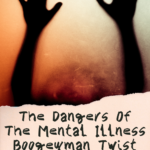Sit with that a moment. A little longer. I really want to say that I just made that up to prove a point, but I didn’t. And what pains my soul the most is that I started this post by scrolling through my mental Rolodex of pretty extensive plot twists in the mystery genre that use mental illness as the boogeyman. There were so many to pick from that it feels like the mental illness boogeyman plot twist is an actual trope of the mystery genre. Putting aside that it is absolutely lazy and unimaginative writing to create an entire book where you can’t think of a single reason for a person to commit a murder beside “they are crazy,” I’m going to focus on the very real world harm that using mental illness as a plot twist does. The point of writing is to say something, so what exactly is being said when the supposedly fun plot twist of a book is to reveal that the killer has a mental illness? Clearly you must fear mental illness.Clearly you must fear anyone who is mentally ill.And add to that fear that they hide amongst us. This probably already sounds familiar to you, because this is how our society and media already treat mental illness. On a daily basis, we see mental illness used as a punchline and/or the unknown that must be feared. All that this fear-mongering accomplishes is harm, and it’s inaccurate. The actual reality is that “…the majority of people who are violent do not suffer from mental illnesses. In fact, people with a mental illness are more likely to be the victims, rather than the perpetrators of violence.” And yet the fire of fear continues to be stoked. Each book using mental illness as the boogeyman plot twist is one more log tossed on the fire of fear. The stigma and discrimination towards people with mental illness grows, leading people to avoid seeking help in order to avoid being labeled. It places people with mental illness in danger from people who see them as an easy victim or wrongly stereotypes them as a violent threat. All for a lazy plot twist. Consider these facts:
Suicide is the second leading cause of death among people aged 10–34. One in four people have a treatable mental illness, but up to 75% of Americans and Europeans don’t seek the help they need. Why? Stigma. A recent study in the journal Psychological Medicine shows that the stigma associated with mental illness is still a major barrier to seeking treatment. 25% to 50% (or more) of fatal encounters with law enforcement involve individuals with mental illness.
These are situations that need understanding, help, and proper training, not dehumanization and stigma. In the wake of the BLM protests against police brutality, some cities have stopped sending police in response to mental health calls, sending trained civilians instead. Surprising to no one who understands the dangers of stigmatizing mental illness, it’s making a positive difference. A lot needs to change to end the stigma of mental illness, and it’s way beyond time that the crime genre at the very least stops using the mental illness boogeyman plot twist.











